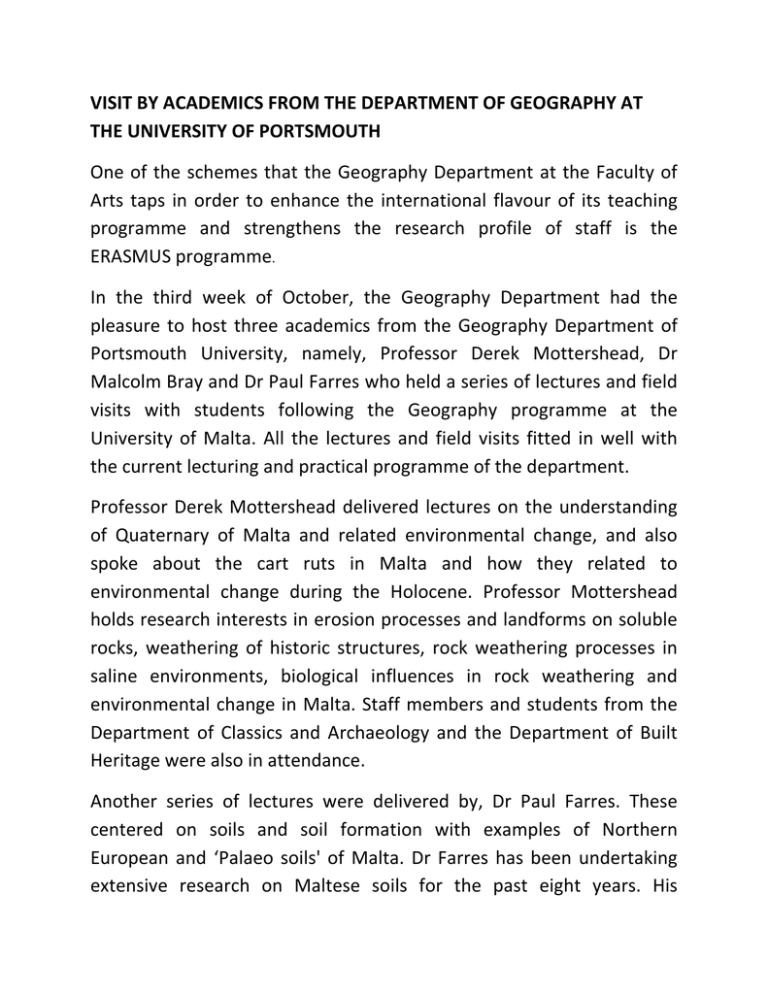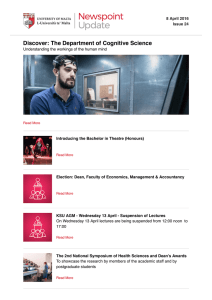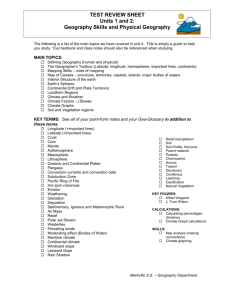VISIT BY ACADEMICS FROM THE DEPARTMENT OF GEOGRAPHY AT
advertisement

VISIT BY ACADEMICS FROM THE DEPARTMENT OF GEOGRAPHY AT THE UNIVERSITY OF PORTSMOUTH One of the schemes that the Geography Department at the Faculty of Arts taps in order to enhance the international flavour of its teaching programme and strengthens the research profile of staff is the ERASMUS programme. In the third week of October, the Geography Department had the pleasure to host three academics from the Geography Department of Portsmouth University, namely, Professor Derek Mottershead, Dr Malcolm Bray and Dr Paul Farres who held a series of lectures and field visits with students following the Geography programme at the University of Malta. All the lectures and field visits fitted in well with the current lecturing and practical programme of the department. Professor Derek Mottershead delivered lectures on the understanding of Quaternary of Malta and related environmental change, and also spoke about the cart ruts in Malta and how they related to environmental change during the Holocene. Professor Mottershead holds research interests in erosion processes and landforms on soluble rocks, weathering of historic structures, rock weathering processes in saline environments, biological influences in rock weathering and environmental change in Malta. Staff members and students from the Department of Classics and Archaeology and the Department of Built Heritage were also in attendance. Another series of lectures were delivered by, Dr Paul Farres. These centered on soils and soil formation with examples of Northern European and ‘Palaeo soils' of Malta. Dr Farres has been undertaking extensive research on Maltese soils for the past eight years. His research interests span from earth surface materials, rainsplash erosion and soil surface changes resulting from soil crusting and sealing. He was one of the first UK geographers to design and use laboratory rainfall simulation and to develop the ideas of using controlled laboratory simulation to study the fundamentals of earth surface processes. In addition, he was the first UK scientist to use soil micromorphology to assess the vertical development of soils crusts and seals and to produce a model of this process and response. Dr Malcolm Bray delivered a series of lectures on contrasting management approaches from the Solent exemplified by Portsmouth, (hard defences) and Selsey (managed realignment). His research interests involve coastal geomorphology and its applications to sediment budget, shoreline management and morphodynamics of gravel beaches and barriers on exposed shorelines. Dr Bray was lead researcher and co-author of the Solent Coastal Habitat Management Plan, and was the scientific co-ordinator of the project Shingle Beach Project. Dr Bray also organised a fieldvisit for the Geography students in which issues of coastal zone management were investigated at l-Ahrax in Mellieha. Throughout the week, other discussions and field visits were also held between the staff members of the two Geography Departments in order to expand further the research collaboration and opportunities that already exist between the departments.




